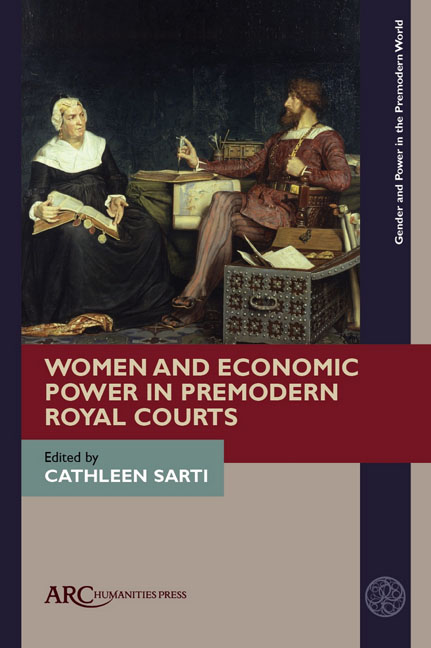Book contents
- Frontmatter
- Contents
- Acknowledgements
- Introduction: Women and Economic Power in Premodern Royal Courts
- 1 The Medieval English Queen as Landholder: Some Reflections on Sources and Methodology
- 2 Financial Power of Empresses and Princess Consorts of the Holy Roman Empire
- 3 “Edward III’s Gold-Digging Mistress”: Alice Perrers, Gender, and Financial Power at the English Royal Court, 1360– 1377
- 4 Counselling the Danish King: Sigbrit Villoms as Financial Mastermind for Christian II, 1513– 1523
- Afterword: “Power Is Money”? Reflections on Money, Power, Sex, and Gender in Premodern Royal Courts
- Bibliography
- Index of Persons and Topics
4 - Counselling the Danish King: Sigbrit Villoms as Financial Mastermind for Christian II, 1513– 1523
Published online by Cambridge University Press: 20 November 2020
- Frontmatter
- Contents
- Acknowledgements
- Introduction: Women and Economic Power in Premodern Royal Courts
- 1 The Medieval English Queen as Landholder: Some Reflections on Sources and Methodology
- 2 Financial Power of Empresses and Princess Consorts of the Holy Roman Empire
- 3 “Edward III’s Gold-Digging Mistress”: Alice Perrers, Gender, and Financial Power at the English Royal Court, 1360– 1377
- 4 Counselling the Danish King: Sigbrit Villoms as Financial Mastermind for Christian II, 1513– 1523
- Afterword: “Power Is Money”? Reflections on Money, Power, Sex, and Gender in Premodern Royal Courts
- Bibliography
- Index of Persons and Topics
Summary
Profess I, Syberich Willems, to have received from the excise-masters of Ribe in Jutland, Andres Laszen and Torsten Smedt, to accountability of said excise 600 [fl.].
Sigbrit Villoms, foremost counsellor to the Danish king Christian II (r. 1513– 1523), later also king of Norway and Sweden, wrote the sentence quoted above in a letter to the town of Ribe in order to confirm the receipt of excise money. This letter is an example of the fact that Sigbrit was hugely influential in the economic and financial governance of the realm, despite being a woman from a merchant background who lacked all the formal requirements usually needed to perform such a high position as a royal counsellor. She was neither formally trained nor was she aristocratic, and not only was she a woman, but she was also a foreigner. Sigbrit was a Dutch widow from a merchant family, and had already been part of Christian's court during his time as co-governor in Norway (1506– 1513), when her daughter, Dyveke, was his mistress. While it was not unusual for monarchs to establish their mistresses at court, the fact that Christian also brought the mother of his mistress with him, first to Oslo and then, after his succession to the Danish throne, to Copenhagen, was peculiar. It was even more remarkable that a foreign, non-noble woman was responsible for Danish economics and finances. Moreover, Sigbrit Villoms certainly used her power to make some changes in Danish politics, and as could be expected, her actions provoked some opposition.
This case study in all its unusualness, therefore, highlights what an (admittedly outstanding) woman could achieve if the circumstances were right. Furthermore, this case study offers the chance to consider economic and financial reforms formed by a female base-born counsellor and a male king with a penchant for non-elites, and the immense opposition against both the reforms and the reformers. In 1523, Christian II was deposed in all three Scandinavian kingdoms and fled to the Low Countries, taking Sigbrit Villoms with him. Important reforms which Christian II introduced with Sigbrit's help were withdrawn, although in at least one case a reform was reestablished more than thirty years later.
- Type
- Chapter
- Information
- Women and Economic Power in Premodern Royal Courts , pp. 73 - 86Publisher: Amsterdam University PressPrint publication year: 2020



